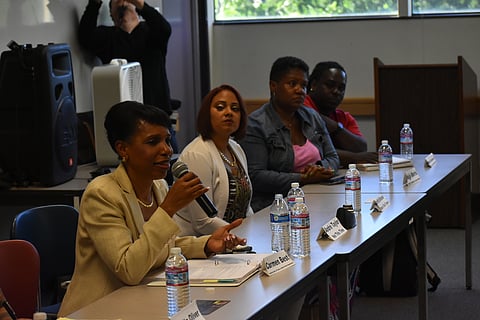At Forum, SPD Chief Candidates Answer Tough Questions On Race
by Neal McNamara
(This article originally appearedon Patch.com and has been republished with permission.)
SEATTLE, WA — The three candidates for the open Seattle police chief job met the public Wednesday night at a forum at the Seattle Vocational Institute in the heart of the Central District. The police reform group Not This Time organized the event, which was largely an opportunity for Seattle's black community to ask the candidates about issues like racism, profiling, and officer-involved shootings.
The forum was held on the fourth floor of the school in a large, sweltering classroom filled to capacity. Each candidate got about 45 minutes to answer questions from the audience, from the Not This Time panel, and from assorted clergy from Seattle churches.
Andre Taylor, brother of Che Taylor, who was shot to death by Seattle police in 2016, is the founder of Not This Time. During an exchange in the middle of the forum with Minneapolis police Inspector Eddie Frizell, Taylor cut straight to the point.
"What's different about you?" Taylor asked, referring to what Frizell would do to change police culture to prevent another officer-involved shooting.
Each candidate — including acting Chief Carmen Best and Austin police Assistant Chief Ely Reyes — was asked some version of that question. And it seemed each candidate had difficulty answering it.
Frizell said that he uses his own experiences with racism — Frizell is Black — to inform how he manages officers. He also said he would commit to increasing the diversity of the force.
Nikkita Oliver, a member of the Not This Time panel, asked each candidate about whether they would commit to dismantling the current system of policing in Seattle. She called the police system inherently racist and rooted in the slave trade.
"We need to start using resources to address the root causes of poverty," Oliver said to Best. "Are you willing to divest from a highly militarized police force?"
Best answered "yes," but clarified that she's interested in using public health methods to address poverty.
"The bottom line is, yeah, you have to have guardians," Frizell said when Oliver asked him a similar question.
Reyes was met with the most lukewarm response. Members of the audience and the panel repeatedly asked him how he had engaged with the black community in Austin.
"My record and our record in Austin speaks for itself," Reyes said, also offering that he had been endorsed by the NAACP chapter in Austin.
Asked what programs he thinks are "innovative" in Seattle, Reyes pointed to the city's navigation teams — a mix of officers and outreach workers who offer help to homeless people before sweeping unsanctioned encampments. Reyes said he could relate to Seattle's gentrification problem because Austin is in a similar situation. He vowed that homelessness would "not be seen as a criminal violation" under his watch.
Frizell was perhaps the most animated candidate. He opened his remarks by telling the crowd about how he had moved from Alabama to Iowa as a child and grew up in Waterloo, which he described as the most segregated city in Iowa. Even as a police officer, he said, he has experienced racism — while out shopping, or just driving with his family.
At one point, Taylor asked Frizell to name the ratio of good to bad cops.
"Ballpark? 80-20," Frizell answered.
Taylor continued, asking if that ratio would still hold if a good officer could still be good if he did nothing while another officer did something bad.
"They're both gone," Frizell responded. "You're just bad if you sit there and watch someone commit a crime against the community."
Best seemed to get the warmest response. She emphasized wanting to humanize cops in neighborhoods where they might be feared. Best would not come out against the under-construction King County youth jail, but she said she wants to intervene with kids before they face incarceration.
Some who attended the forum said they weren't totally in favor of any candidate, although Best stood out because she's a familiar face.
"Carmen has a history here," said Paul Jackson, a member of the Seattle Breakfast Club, a 40-year-old youth community service organization. "I want someone who knows the community."
Katrina Johnson, cousin of Charleena Lyles, who was killed by Seattle police in June 2017, asked each candidate pointed questions about police violence — including Best. She said that Best last year had promised to answer questions about Lyles' death for the family, but never came through.
"I'm not impressed by any of them," she said. But Johnson said that she felt most comfortable with Best, like she could go to her if she had a problem.
The Rev. Kenneth Ransfer of Greater Mt. Baker Baptist Church was also a Best fan. During an exchange with Reyes, Ransfer raised comments made by Donald Trump last summer seeming to encourage cops to get rough with suspects. He wondered if Reyes would favor psychological exams for new recruits to ensure they don't have racial bias. In response, Reyes denied that there are any racist police in his Austin department.
"I felt closest to Chief Best," Ransfer said after the forum. "I've worked with her throughout the years, and we see her at all different venues."
"We're at a critical moment in this city, and she's been there. We need someone from the inside."
Images by Neal McNamara/Patch.com
Help keep BIPOC-led, community-powered journalism free — become a Rainmaker today.


